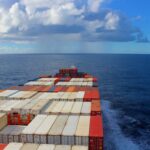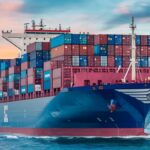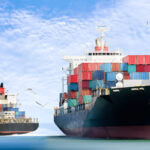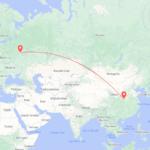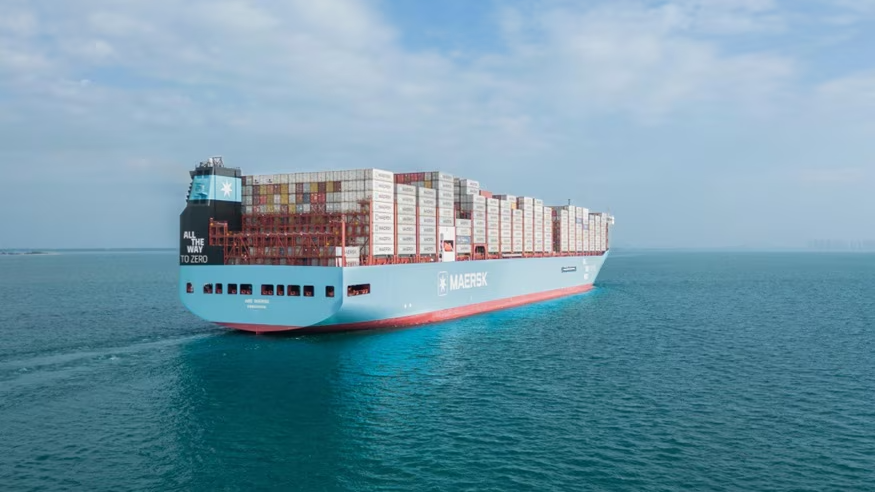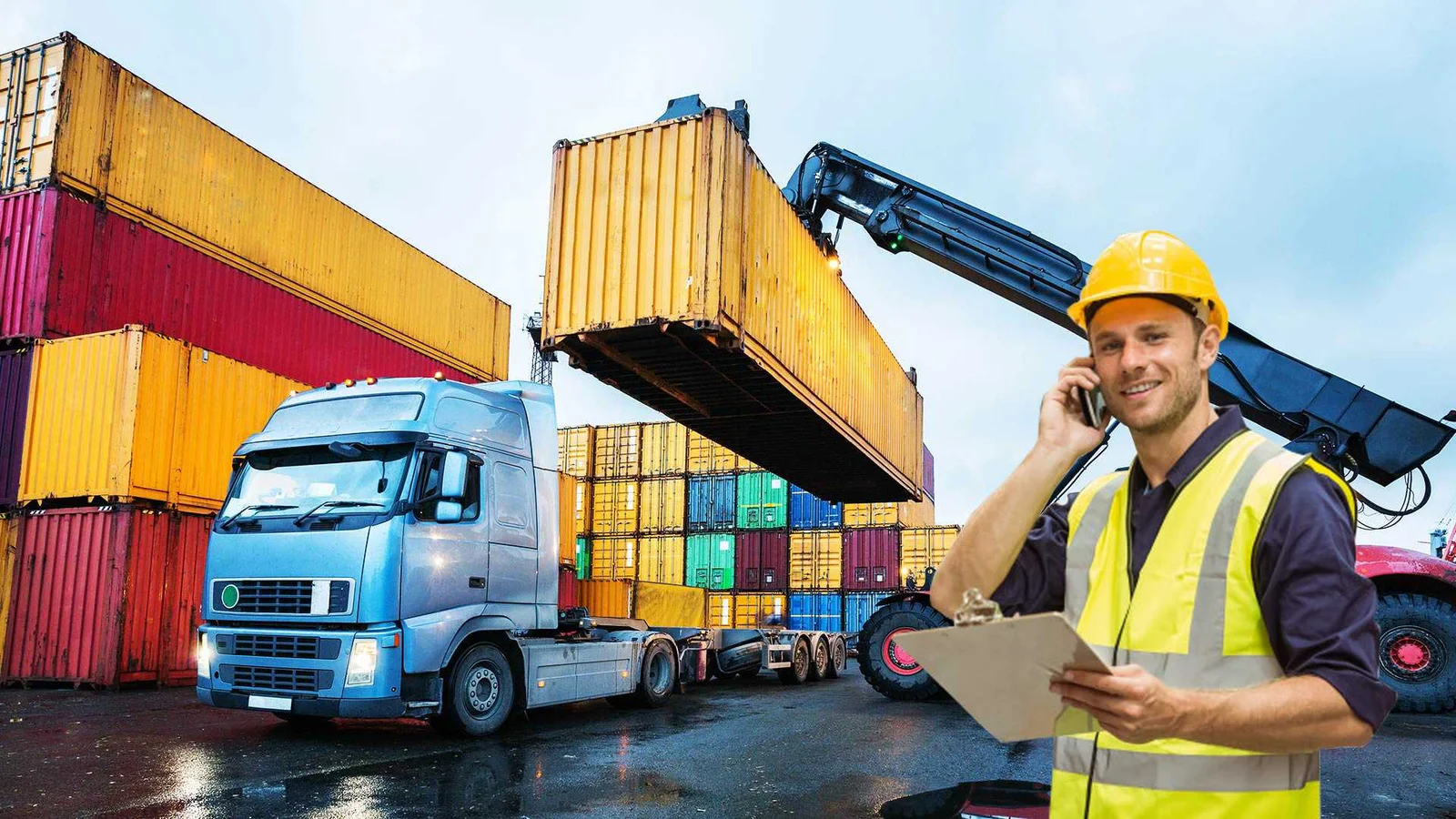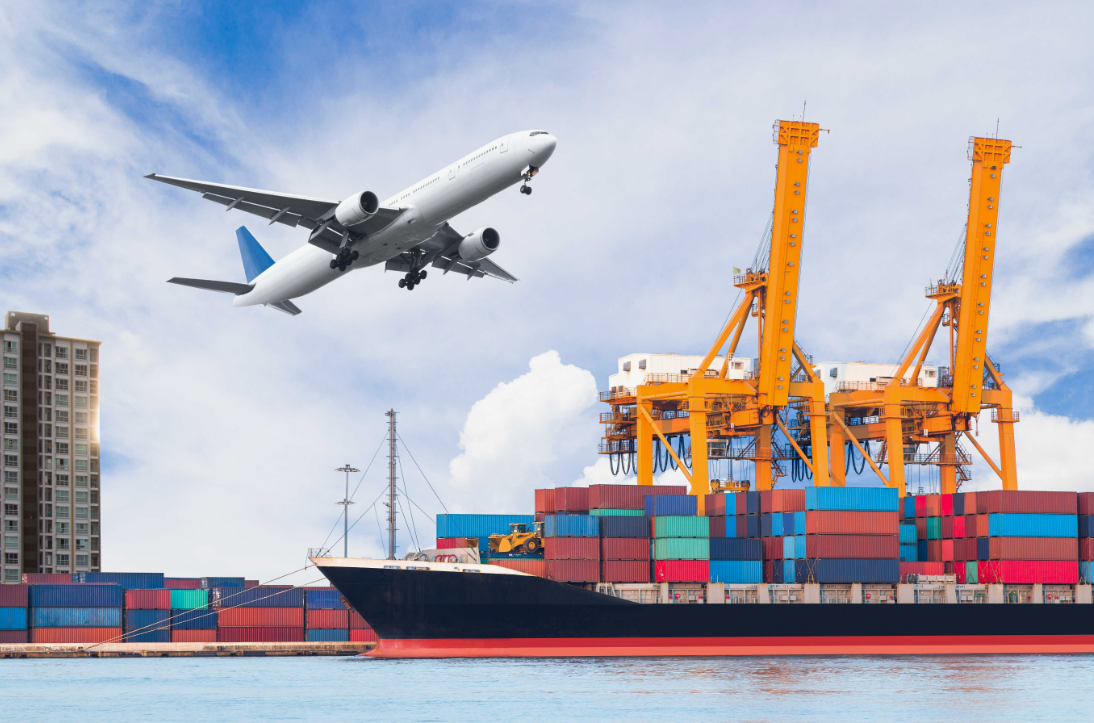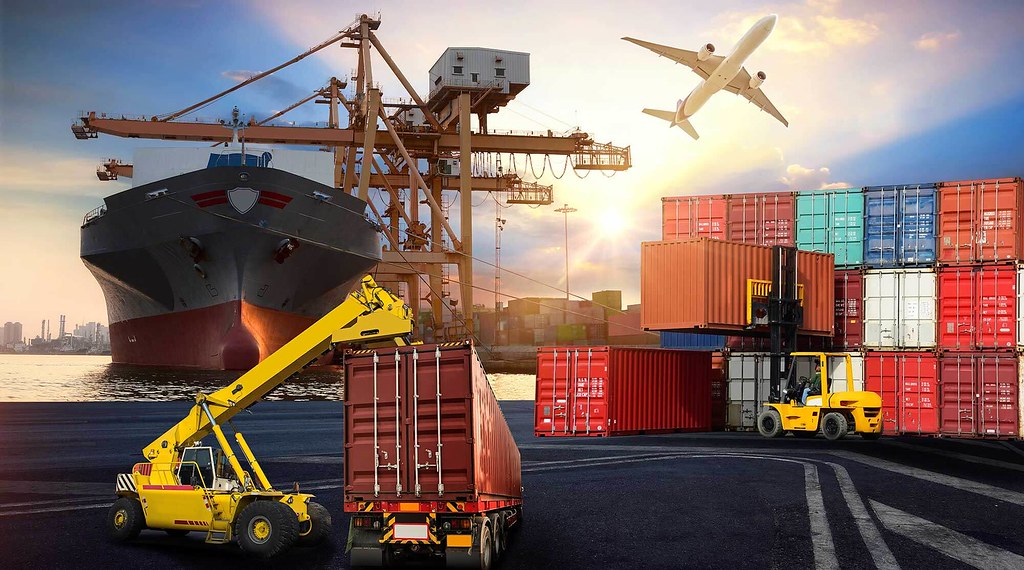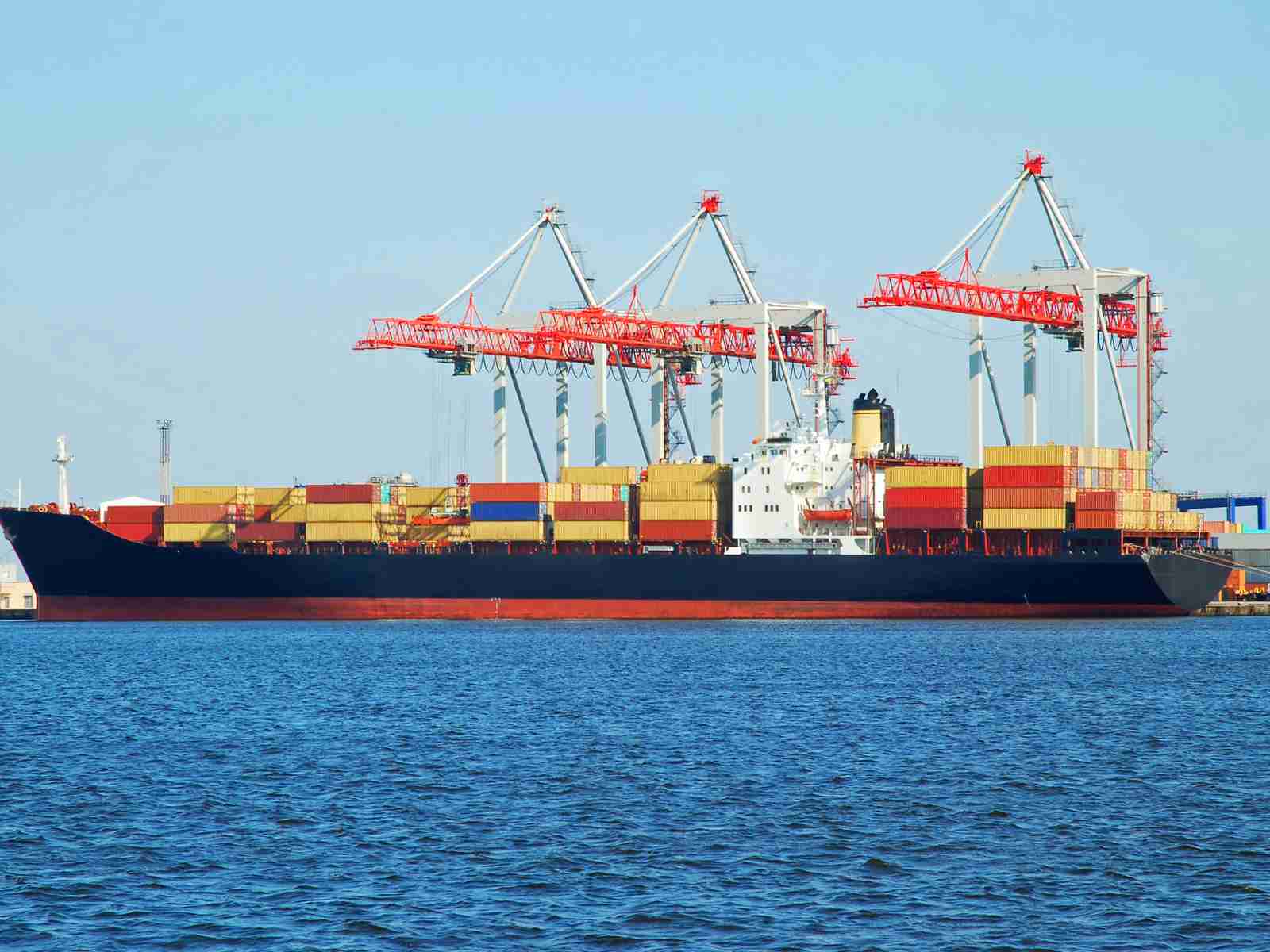Trade relations between China and Nigeria have grown significantly, with Nigeria becoming one of Africa’s largest economies and growing demand for Chinese imports. Not only can shipping by sea provide significant cost savings for bulk imports, but it also provides businesses with an environmentally friendly option. This article takes you through the different modes of sea shipping, the major Chinese and Nigerian seaports involved, and the intricacies of the shipping process that are critical to optimizing imports from China to Nigeria and improving supply chain efficiency.
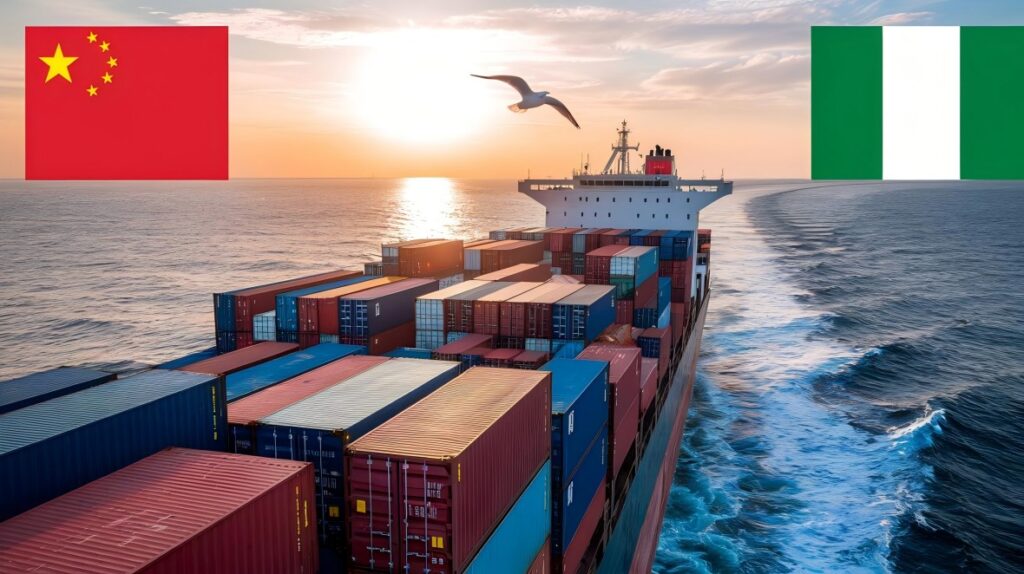
Introduction to Sea Freight From China to Nigeria
The growing trade relationship between China and Nigeria has become a significant driver of economic expansion for both nations. Nigeria stands as one of the largest economies in Africa, demonstrating a burgeoning demand for goods sourced from China. This relationship has been further amplified by China’s strategic investments in Nigerian infrastructure, manufacturing, and technology. The synergy between the two countries has led to an increase in imports, particularly in sectors such as consumer electronics, textiles, machinery, and construction materials.
When it comes to shipping these goods, sea freight serves as a reliable and cost-effective means of transportation. Notably, maritime shipping accounts for more than 90% of international trade volume, underscoring its critical role in global logistics. Sea freight offers several advantages for importing goods from China to Nigeria, including:
- Cost Efficiency: Shipping large quantities of goods by sea is considerably cheaper than air freight, making it an ideal choice for bulk imports.
- Environmentally Friendly: Sea freight has a lower carbon footprint compared to other shipping methods, aligning with increasing global awareness around sustainability.
- Capacity for Large Shipments: The ability to transport oversized cargo and high volumes makes sea freight suitable for diverse goods ranging from heavy machinery to consumer products.
- Dependable Transit Times: While sea freight may require longer transit times than air freight, schedules are generally reliable, contributing to improved supply chain planning.
Understanding Sea Freight Options
When considering sea freight from China to Nigeria, businesses have two primary shipping options: Full Container Load (FCL) and Less-than-Container Load (LCL). Each option comes with its own set of benefits and considerations, allowing importers to select the mode that best suits their shipping needs.
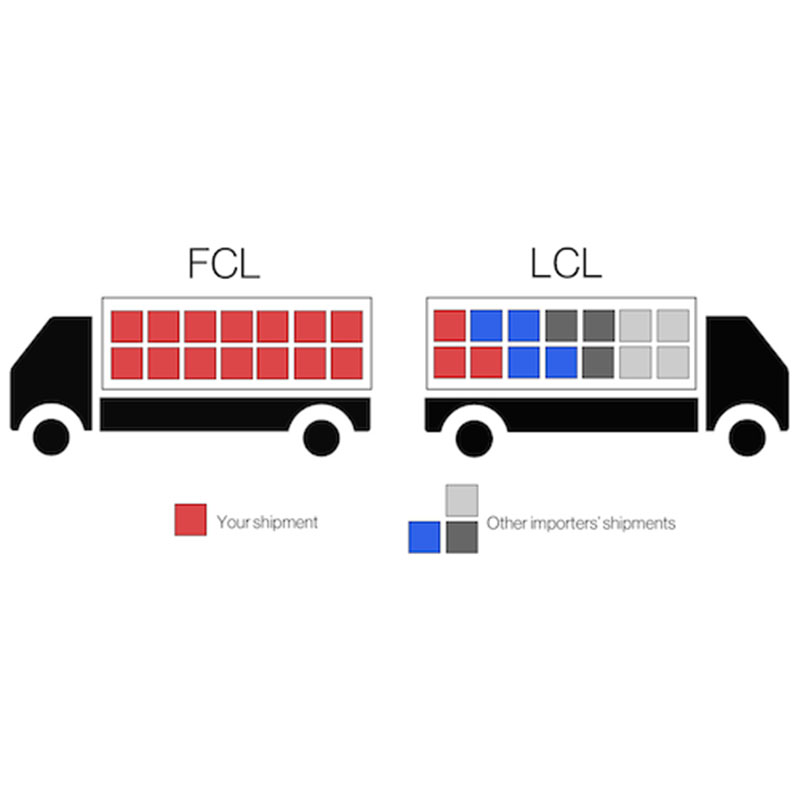
Full Container Load (FCL) Shipping
Benefits of FCL Shipping
FCL shipping involves renting an entire shipping container, allowing importers to maximize their cargo space. The benefits of FCL shipping include:
- Lower Cost per Unit: When shipping large volumes, the cost per unit decreases, making FCL an economical choice for bulk importers.
- Faster Transit Times: FCL shipments typically have faster transit times due to fewer stops and less handling, reducing the risk of delays.
- Lower Risk of Damage: Having a dedicated container minimizes the risk of damage often associated with handling shared cargo in LCL shipments.
- Simplified Customs Clearance: Importing an entire container streamlines the customs clearance process, as the shipment is treated as a single entity.
Factors Affecting FCL Shipping Costs
While FCL shipping is often cost-effective, several factors can influence the overall shipping costs:
- Container Size: Standard container sizes are usually 20-foot or 40-foot; the choice affects the total cost.
- Port Fees: Charges at both origin and destination ports can vary, impacting the total cost.
- Seasonality: Shipping costs may fluctuate based on peak seasons, demand, and fuel prices.
- Insurance: Opting for cargo insurance can add to the total fee but provides added security against risks.
Less-than-Container Load (LCL) Shipping
Advantages of LCL Shipping
LCL shipping allows importers to share container space with other customers, making it ideal for smaller shipments. The benefits of LCL shipping include:
- Flexibility: LCL shipping is suitable for businesses that do not have enough cargo to fill an entire container, enabling them to transport smaller quantities without excess costs.
- Lower Initial Investment: Importers can pay only for the space they use rather than renting an entire container, reducing upfront shipping costs.
- Access to More Frequent Sailings: LCL services often have more frequent departures, providing greater flexibility in shipping schedules.
Considerations for LCL Shipping
While LCL shipping offers advantages, there are several considerations to keep in mind:
- Higher Cost per Unit: For smaller shipments, the cost per unit can be higher compared to FCL due to shared container fees.
- Longer Transit Times: LCL shipments may take longer to reach their destination due to the need for consolidation and deconsolidation at ports.
- Increased Risk of Damage: Shared container space means that cargo could be subject to more handling, increasing the potential for damage.
- Complex Customs Clearance: The customs clearance process can be more complicated for LCL shipments, as multiple shipments are consolidated into one container, requiring additional documentation and coordination.
In summary, both FCL and LCL shipping options offer distinct benefits for importing goods from China to Nigeria. The choice between the two should be informed by the volume of goods, budget constraints, and specific shipping timelines. Dantful International Logistics provides expertise in navigating these options, ensuring you make the right decision for your import needs. With services tailored for efficiency and cost-effectiveness, Dantful stands ready to support your shipping requirements.
READ MORE:
- Shipping From China To Algeria
- Shipping From China To Angola
- Shipping From China To Morocco
- Shipping From China To Nigeria
- Shipping From China To Kenya
- Shipping From China To Tanzania
- Shipping From China To South Africa
Top Chinese Seaports for Exports to Nigeria
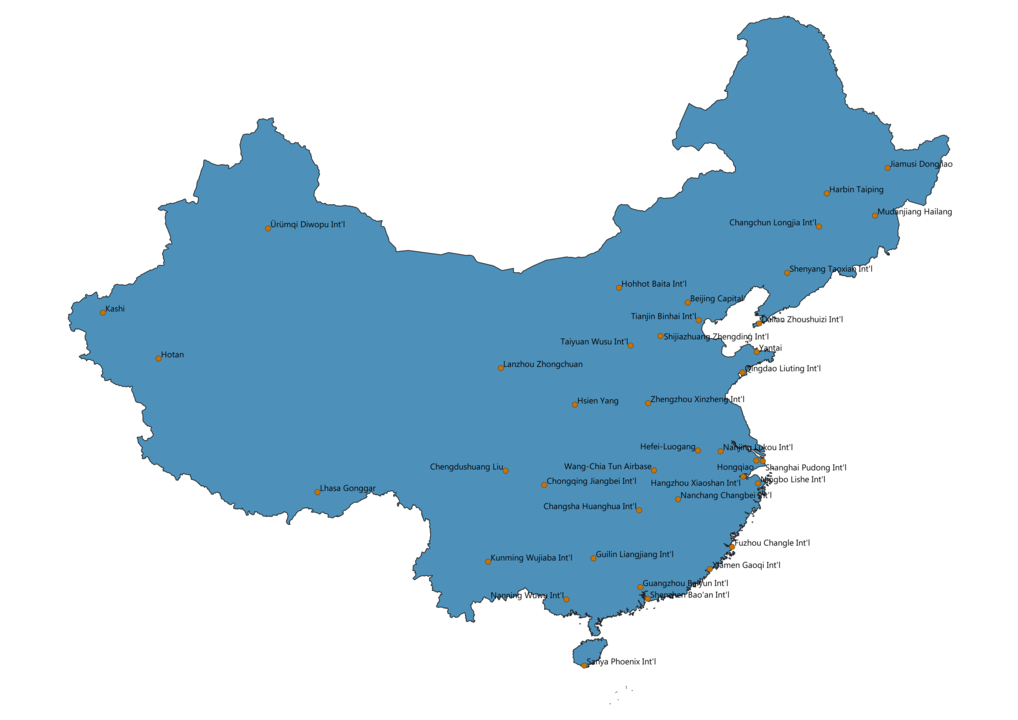
When exporting goods from China to Nigeria, several seaports play crucial roles in facilitating efficient shipping. Understanding these key ports can help businesses optimize their logistics and reduce transit times.
Shanghai
As one of the busiest and most advanced ports globally, Shanghai serves as a main hub for international trade. It boasts extensive infrastructure, including state-of-the-art container terminals, which ensure swift loading and unloading processes. The port can handle a significant volume of cargo, making it ideal for large-scale exports to Nigeria. Additionally, Shanghai has a robust transport network connecting it to various inland cities, further enhancing its accessibility.
Shenzhen
Located in southern China, Shenzhen is renowned for its proximity to Hong Kong and its status as a major manufacturing center. The port of Shenzhen specializes in handling electronic goods, textiles, and consumer products, which are often in high demand in Nigeria. Its efficient operations and modern facilities facilitate quick turnaround times, making it an attractive option for businesses looking to export goods to Nigeria.
Ningbo-Zhoushan
The Ningbo-Zhoushan Port is notable for being one of the largest ports in terms of cargo tonnage. It serves as a vital gateway for goods moving from central and eastern China to international markets, including Nigeria. The port’s strategic location and comprehensive shipping services make it an essential point for exporters aiming to reach Nigerian markets.
Guangzhou
Guangzhou, the capital of Guangdong province, is a significant port for exports to Nigeria. It is known for its diverse range of exported goods, including machinery, textiles, and consumer electronics. The Guangzhou port benefits from robust logistics services, which enhance the efficiency of container handling and expedite shipping processes to Nigeria.
Qingdao
Qingdao Port is another critical seaport in China, particularly recognized for its role in the export of agricultural products and machinery. Its modern facilities and excellent connectivity to major rail and road networks support efficient export operations. Qingdao’s strategic location on the Yellow Sea allows for competitive shipping routes to Nigeria.
Tianjin
As one of the largest ports in northern China, Tianjin serves as a key gateway for exports to Nigeria. Its extensive container terminal facilities and advanced cargo handling equipment enable efficient processing of shipments. Tianjin is well-connected to Beijing and other major cities, ensuring that goods can be transported quickly from inland areas to international waters.
Main Nigeria Seaports for Imports
Upon arrival in Nigeria, imported goods enter through several major seaports, each equipped to handle various types of cargo and facilitate smooth customs clearance. Understanding these ports is vital for businesses looking to efficiently import goods from China.
Lagos Port Complex (Apapa and Tin Can Island)
The Lagos Port Complex, which includes Apapa Port and Tin Can Island Port, is the largest and busiest port in Nigeria. Located in the commercial capital, Lagos, the port handles a significant portion of the country’s imports. Apapa is known for containerized cargo, while Tin Can focuses on bulk and breakbulk shipments. The port’s proximity to major urban centers ensures rapid distribution of goods throughout Nigeria.
Port Harcourt
Located in the Niger Delta region, Port Harcourt is a key seaport for oil and gas-related imports. It also handles general cargo and agricultural products. The port’s strategic location facilitates access to the southeastern markets of Nigeria, making it an essential point for businesses involved in importing various goods.
Onne Port
Onne Port, also situated in the Niger Delta, is specifically designed for oil and gas operations. However, it also serves as an entry point for various imported goods. The port has a well-developed infrastructure to support offshore and onshore logistics, catering to both oil-related imports and general cargo.
Calabar Port
The Calabar Port is the main gateway for trade in the southeastern region of Nigeria. Although it handles smaller volumes of cargo compared to other ports, it is essential for the importation of goods into that region. The port’s strategic location allows for easier access to neighboring countries, facilitating regional trade.
Warri Port
Warri Port primarily serves the Delta State and surrounding regions. It handles a diverse range of imports, including agricultural products and manufactured goods. The port’s facilities are geared towards general cargo, making it a crucial part of Nigeria’s import infrastructure.
Understanding the dynamics of both Chinese and Nigerian seaports is essential for optimizing the logistics of importing goods. Businesses engaging in international trade can benefit from this knowledge by choosing the most suitable ports for their shipping and receiving needs, thereby enhancing operational efficiency. Dantful International Logistics offers comprehensive support in navigating these logistics, ensuring your imports from China are handled with expertise and precision.
Sea Freight Shipping Process
When engaging in sea freight for importing goods from China to Nigeria, understanding the shipping process is critical. Each step involves specific actions and documentation that ensure the smooth transportation of goods.
Booking and Documentation
The first step in the sea freight shipping process is making a booking with a freight forwarder or shipping company. This involves:
- Choosing a Shipping Method: Importers can opt for either Full Container Load (FCL) or Less-than-Container Load (LCL) based on their needs.
- Preparing Documentation: Necessary documentation includes the Bill of Lading, commercial invoice, packing list, and any other required export permits. This documentation is crucial for customs clearance and ensuring compliance with international shipping regulations.
Container Loading and Sealing
Once the booking is confirmed, the next step involves loading the goods into shipping containers. Key actions during this stage include:
- Container Selection: Importers must select the appropriate container type (standard, refrigerated, etc.) based on the nature of the cargo.
- Cargo Loading: Goods should be loaded securely to prevent movement during transit. Proper loading techniques minimize the risk of damage.
- Sealing the Container: After loading, containers are sealed with a tamper-proof seal, ensuring security during ocean transit. The seal number should be recorded for tracking and customs purposes.
Ocean Transportation
With the container sealed and documentation completed, the goods are ready for ocean transportation. This phase encompasses:
- Departure: Containers are transported to the designated seaport and loaded onto the vessel.
- Transit: The ocean freight journey can take several weeks, depending on the shipping route and distance. During this period, tracking systems allow importers to monitor the shipment’s status.
Customs Clearance in Nigeria
Upon arrival at a Nigerian port, goods must undergo customs clearance. This step is vital for compliance with local regulations, involving:
- Submission of Documentation: Importers must present essential documents, including the Bill of Lading, invoice, and customs declaration to the Nigerian Customs Service.
- Inspection: Customs officials may inspect the cargo to verify that it matches the declaration and complies with Nigerian import regulations.
- Payment of Duties and Taxes: Importers are required to pay applicable customs duties and taxes before the goods can be released.
Final Delivery to Destination
Once customs clearance is completed, the final step involves the delivery of goods to their designated location. This includes:
- Transporting to Warehouses or Final Destinations: Post-clearance, the container can be transported to warehouses for storage or directly to the business location.
- Unloading and Distribution: Upon arrival, the goods are unloaded, and distribution plans can be executed based on business needs. This may involve additional logistics services, such as local transportation or warehousing.
Understanding the sea freight shipping process allows businesses to better anticipate and manage each stage, ensuring a smoother import experience from China to Nigeria. Dantful International Logistics provides expert guidance throughout this process, ensuring compliance with all regulations and minimizing delays.
You may be interested in the following related articles:
- The Benefits of Choosing Door to Door Shipping from China to Belgium
- The Ultimate Guide to Container Shipping Costs from China to Colombia in 2024
- The Ultimate Guide to Door to Door Shipping from China to Libya
- Ultimate Guide to Find the Cheapest Shipping Companies from China to Argentina
- The Ultimate Guide to Sea Freight from China to Saudi Arabia
- The Ultimate Guide to Hazmat Freight Forwarder from China to Guatemala
Factors Affecting Sea Freight Costs
When considering sea freight, various factors influence the overall shipping costs. Analyzing these factors can help businesses make informed decisions regarding their shipping strategies.
Container Size and Type
The dimensions and type of container used significantly impact the shipping costs. Standard 20-foot and 40-foot containers are common, but specialized containers (e.g., refrigerated or flat-rack) can incur additional fees. Selecting the right container based on cargo requirements ensures that costs are optimized.
Shipping Route and Distance
The chosen shipping route and distance from the port of origin in China to the destination port in Nigeria greatly affect costs. Shorter routes may be more economical, while routes with multiple stops could increase the overall price. Route efficiency and direct shipping lanes typically result in lower costs.
Fuel Prices and Surcharges
Fuel costs are a major component of sea freight pricing. Fluctuations in oil prices can lead to fuel surcharges being added to shipping costs. Freight forwarders often adjust rates based on the prevailing fuel prices to maintain profitability.
Customs Duties and Taxes
Importing goods into Nigeria involves customs duties and taxes that vary based on the type and value of the goods. Understanding the applicable tariffs is critical for budgeting and ensuring compliance with local regulations. These costs can be calculated in advance to avoid unexpected expenses.
Insurance and Handling Fees
Insurance protects against potential loss or damage during transit, and the cost varies based on the value of the cargo and the selected coverage level. Additionally, handling fees can arise from loading, unloading, and warehousing services. Evaluating these fees when calculating total shipping costs helps in determining the overall investment for importing goods.
By recognizing the various factors affecting sea freight costs, businesses can better plan their budgets and improve their supply chain efficiency. Dantful International Logistics is equipped to assist clients in navigating these complexities, providing tailored solutions for cost-effective shipping from China to Nigeria.
Tips for Optimizing Sea Freight From China to Nigeria
Efficiently managing the logistics of sea freight from China to Nigeria requires a strategic approach to ensure smooth operations. Below are essential tips for optimizing this process.
Choosing the Right Shipping Partner
Selecting a reliable shipping partner is a critical decision that impacts the entire shipping experience. An ideal partner should have experience in international logistics and a proven track record of timely deliveries. It’s important to evaluate potential partners based on their network of relationships in both China and Nigeria, as well as their ability to handle customs documentation and compliance effectively. Collaboration with a knowledgeable freight forwarder like Dantful International Logistics can greatly enhance your shipping efficiency, providing insights and support throughout the journey.
Proper Packaging and Labeling
Effective packaging and labeling are vital for protecting goods during transit and ensuring compliance with international shipping regulations. Consider the following best practices:
- Use Durable Materials: Ensure that packaging materials are robust enough to withstand the rigors of sea transport.
- Label Clearly: All packages should be labeled with clear and accurate shipping information, including destination, contents, handling instructions, and any necessary compliance markings.
- Consider Palletization: For larger shipments, using pallets can help streamline loading and unloading processes and reduce the risk of damage.
Timely Communication with Stakeholders
Maintaining timely communication with all stakeholders throughout the shipping process is essential. This includes:
- Regular Updates: Keep all parties informed about shipment status, potential delays, and any issues that may arise during transit.
- Collaboration with Customs Brokers: Work closely with customs brokers to ensure that all documentation is accurate and submitted on time, minimizing the risk of customs delays.
- Feedback Mechanism: Establish a system for receiving feedback from your shipping partner and stakeholders to improve future operations.
Staying Updated on Regulations and Requirements
The regulatory landscape for shipping can evolve rapidly, particularly with customs and import requirements. It is essential to:
- Monitor Changes: Stay informed about any changes in import regulations in Nigeria or export requirements in China that may affect your shipments.
- Training and Resources: Ensure that your team is adequately trained and has access to resources outlining the latest shipping requirements and restrictions.
- Engage Experts: Consult with logistics experts or freight forwarders who are well-versed in current regulations to ensure compliance and avoid costly penalties.
You may be interested in the following related articles:
- The Benefits of Choosing Door to Door Shipping from China to Belgium
- The Ultimate Guide to Container Shipping Costs from China to Colombia in 2024
- Ultimate Guide to Find the Cheapest Shipping Companies from China to Argentina
- The Ultimate Guide to Hazmat Freight Forwarder from China to Guatemala
- Sea Freight from China to Greece: A Complete Step-by-Step Process
- Tips to Find the Cheapest Shipping Company from China to Mexico
Choosing the Right Sea Freight Forwarder
Selecting the right sea freight forwarder is instrumental in ensuring that your shipping process is seamless and efficient. This choice can significantly affect the success of your import operations.
Qualities of a Reliable Freight Forwarder
When evaluating freight forwarders, consider the following qualities:
- Experience and Expertise: Look for a forwarder with extensive experience in handling shipments from China to Nigeria and knowledge of the specific logistics challenges involved.
- Global Network: A strong network of agents and partners across both countries can enhance shipment reliability and provide better pricing options.
- Customer Service: Exceptional customer service is essential for addressing concerns promptly and effectively, ensuring smooth operations.
- Transparent Pricing: Opt for a forwarder who provides clear and upfront pricing, avoiding hidden fees that could complicate budgeting.
Questions to Ask When Selecting a Forwarder
To make an informed decision when selecting a freight forwarder, consider asking the following questions:
- What is your experience with shipments to Nigeria?: Understanding their familiarity with Nigerian customs and logistics is crucial.
- How do you handle customs clearance?: Clarify their processes for ensuring compliance and minimizing delays at customs.
- What services do you offer?: Ensure that the forwarder offers comprehensive services, including insurance, warehousing, and customs clearance.
- Can you provide references?: Requesting references from past clients can provide insight into their reliability and service quality.
Why Choose Dantful Logistics
Dantful International Logistics stands out as a reliable partner for sea freight from China to Nigeria. With a strong focus on providing highly professional, cost-effective, and high-quality logistics services, Dantful offers a comprehensive suite of solutions tailored to meet the needs of businesses importing goods. Key advantages of choosing Dantful include:
- Expert Guidance: Our team of experienced professionals understands the complexities of international shipping and is dedicated to guiding you through every step.
- Robust Network: Dantful’s established relationships with key stakeholders in both China and Nigeria ensure efficient operations and responsive service.
- Customized Solutions: We tailor our services to fit your specific shipping requirements, whether you are looking for door-to-door shipping, warehousing, or customs support.
- Commitment to Transparency: Dantful believes in clear communication and transparent pricing, allowing you to manage your logistics budget effectively.
By partnering with Dantful International Logistics, you can optimize your sea freight process and focus on growing your business while we handle your shipping needs with expertise and care.
Dantful International Logistics Services:
- Dantful Ocean Freight Services
- Air Freight From China
- Amazon FBA Freight Forwarding
- WAREHOUSE Services
- One-Stop Customs Clearance Solution
- Cargo Insurance Services in China
- DDP Shipping Services By Dantful Logistics
- Out of Gauge Cargo Transportation Shipping Services
FAQs
1. What is the difference between FCL and LCL shipping?
- FCL (Full Container Load) involves renting an entire shipping container, making it cost-effective for large shipments. It offers lower costs per unit, faster transit times, and reduced risk of damage.
- LCL (Less-than-Container Load) allows multiple importers to share container space, making it ideal for smaller shipments. While it offers flexibility and lower initial costs, it generally has a higher cost per unit and longer transit times.
2. What are the main Chinese seaports for shipping to Nigeria?
- The key seaports in China for exports to Nigeria include Shanghai, Shenzhen, Ningbo-Zhoushan, Guangzhou, Qingdao, and Tianjin. Each port has unique advantages in terms of infrastructure and types of goods handled.
3. Which Nigerian seaports handle imports?
- Major ports in Nigeria for imports include the Lagos Port Complex (Apapa and Tin Can Island), Port Harcourt, Onne Port, Calabar Port, and Warri Port. These ports are equipped to handle various types of cargo and facilitate smooth customs clearance.
4. What factors affect sea freight shipping costs?
- Several factors influence sea freight costs, including container size and type, shipping route and distance, fuel prices, customs duties and taxes, and insurance and handling fees.
5. How does the sea freight shipping process work?
- The sea freight shipping process includes several stages: booking and documentation, container loading and sealing, ocean transportation, customs clearance in Nigeria, and final delivery to the destination.
6. Why is choosing the right freight forwarder important?
- A reliable freight forwarder can greatly impact the efficiency and success of your shipping operations. Look for qualities such as experience, a strong global network, exceptional customer service, and transparent pricing.

Young Chiu is a seasoned logistics expert with over 15 years of experience in international freight forwarding and supply chain management. As CEO of Dantful International Logistics, Young is dedicated to providing valuable insights and practical advice to businesses navigating the complexities of global shipping.
The other language versions of this article
- الدليل الشامل للشحن البحري من الصين إلى نيجيريا
- De ultieme gids voor zeevracht van China naar Nigeria
- Le guide ultime du fret maritime de la Chine vers le Nigéria
- Der ultimative Leitfaden für Seefracht von China nach Nigeria
- La guida definitiva al trasporto marittimo dalla Cina alla Nigeria
- La guía definitiva para el transporte marítimo de China a Nigeria
- O guia definitivo para frete marítimo da China para a Nigéria
- Полное руководство по морским грузоперевозкам из Китая в Нигерию
- Çin’den Nijerya’ya Deniz Taşımacılığı İçin Nihai Kılavuz


